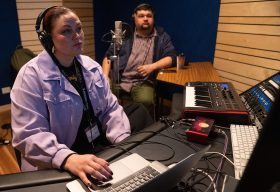A growing shortage of skilled theatre jobs is hitting regional venues hard, but one Queensland theatre is taking a bold step to change that.
In Toowoomba, 127 km west of Brisbane, the historic Empire Theatre has long served as a training ground for emerging artists. But in recent years, the regional hub has faced mounting pressure to fill vital technical theatre jobs. The talent pipeline has slowed, and education pathways have dried up.






